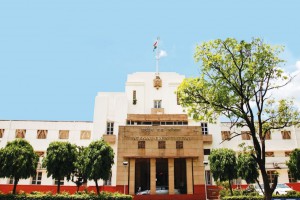National Green Tribunal, New Delhi (NGT): The coram of Adarsh Kumar Goel J (Chairperson), Sudhir Agarwal (Judicial Member), JJ. and Prof. A. Senthil Vel (Expert Member) took up the issue of monitoring of solid waste management as per orders of the Supreme Court in Almitra H. Patel v. Union of India, 2014 SCC OnLine SC 1844, order dated 02.09.2014 as well as liquid waste management in Paryavaran Suraksha v. Union of India, (2017) 5 SCC 326 and awarded compensation of Rs. 12000 crore under S. 15 of National Green Tribunal Act, 2010 to remedy the continuing damage to the environment.
Orders of the Supreme Court
With regards to monitoring of solid waste management, the Supreme Court relied on Municipal Council, Ratlam v. Vardhichand, (1980) 4 SCC 162 and B.L. Wadhera v. Union of India, (1996) 2 SCC 594 where it was held that clean environment is fundamental right of citizens under Article 21 and the local bodies as well as the State should ensure that public health is preserved by taking all possible actions and held that “…handling of solid municipal waste is a perennial challenge and would require constant efforts and monitoring with a view to making the municipal authorities concerned accountable, taking note of dereliction, if any, issuing suitable directions consistent with the said Rules and direction incidental to the purpose underlying the Rules such as upgradation of technology wherever possible. All these matters can, in our opinion, be best left to be handled by the National Green Tribunal established under the National Green Tribunal Act, 2010.”
With regards to monitoring of liquid waste management, the Supreme Court in Paryavaran Suraksha v. Union of India, (2017) 5 SCC 326 held that “the Secretaries to the Government concerned shall be responsible for monitoring the progress and issuing necessary directions to the Pollution Control Board concerned, as may be required, for the implementation of the above directions. They shall be also responsible for collecting and maintaining records of data, in respect of the directions contained in this order. The said data shall be furnished to the Central Ground Water Authority, which shall evaluate the data and shall furnish the same to the Bench of the jurisdictional National Green Tribunal. To supervise complaints of non-implementation of the instant directions, the Benches concerned of the National Green Tribunal, will maintain running and numbered case files, by dividing the jurisdictional area into units.”
Tribunal’s Take
With regards to solid waste management, the Tribunal has considered the matter in the last eight years and as far as for liquid waste management, more than five years. The Tribunal Stated that
“Moreover, without fixing quantified liability necessary for restoration, mere passing of orders has not shown any tangible results in the last eight years (for solid waste management) and five years (for liquid waste management), even after expiry of statutory/laid down timelines. Continuing damage is required to be prevented in future and past damage is to be restored.”
The Tribunal observed that there is no meaningful progress and there are huge gaps in management of solid as well as liquid waste. The Tribunal stated that further steps are to be taken for past violations liability of the State in terms of monetary compensation on ‘Polluter Pays’ principle which will be utilised for restoration of damage to the environment.
The Tribunal also stated that restoration measures for sewage management would include, establishing sewage treatment and utilisation systems, ensuring compliance with standards, upgrading systems/operations to ensure full capacity utilisation and establishing proper faecal sewage and sludge management in rural areas.
For solid waste management, the Tribunal suggested for segregation of the solid waste at its source and at earliest processing which includes establishment of waste processing units for adequate compositing/vermicomposting/bio-methanation and rehabilitation of 84 sites that have been overlooked.
The Tribunal also suggested that bioremediation/bio-mining process must be carried out in accordance with CPCB guidelines. The Tribunal stated that the restoration plan must be executed in a time bound manner and if violations continued, additional compensation may be considered against the State.
“This restoration plan needs to be planned and executed in a time bound manner without further delay. If violations continue, liability to pay additional compensation may have to be considered. Compliance will be the responsibility of the Chief Secretary”
The Tribunal observed that it is high time that the State realize its duty towards law and citizens and adopts further monitoring at its own level and decided to rest compensation on State as per Polluter Pays principle under S. 20 of the NGT Act, 2010.
“Compensation has to be equal to the loss to the environment and also taking into account cost of remediation.”
The Tribunal relied on Abhisht Kusum Gupta v. State of U.P., 2021 SCC OnLine NGT 205 and determined the compensation of ₹10,840 crores in respect of gap in treatment of liquid waste and ₹1,200 Crores in respect of un-remediated legacy waste, in total ₹12,000 crores and directed the State of Maharashtra to deposit the same in a separate ring-fenced account within two months which is to be operated as per directions of Chief Secretary for restoration measures. Further, it has also been directed to Chief Secretary to consider filing six monthly progress reports with a copy to the Registrar General of this Tribunal.
[In re: Compliance of Municipal Solid Waste Management Rules, 2016 and other environmental issues, 2022 SCC OnLine NGT 209, decided on 08.09.2022]
*Ritu Singh, Editorial Assistant has put this report together.

